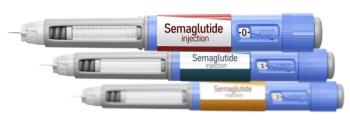
Price negotiations, effective in 2027, cover drugs for diabetes, cancer, COPD, and more, aiming for substantial Medicare savings.

Price negotiations, effective in 2027, cover drugs for diabetes, cancer, COPD, and more, aiming for substantial Medicare savings.

The 20.7% weight loss with the high-dose of semaglutide bested the mean reduction of 17.5% seen with semaglutide 2.4 mg, according to Novo Nordisk.

Your daily dose of the clinical news you may have missed.

The DEA action includes 3 new telehealth rules that make permanent several flexibilities enacted during the pandemic and also establish new protections for patients.

Mineralys Therapeutics also expects topline data from its phase 2 study of lorundrostat for the treatment of uncontrolled hypertension or resistant hypertension when used as an add-on therapy.

The effective approach to identifying risk for the disruptive cognitive issues holds promise for development of early intervention to mitigate decline.

The Florey Dementia Index showed robustness across different cohorts but more testing is needed, researchers reported.

The agency estimates that limiting nicotine levels could lead to 1.8 million fewer tobacco-related deaths by 2060 and health care savings of $1.1 trillion a year over the next 40 years.

"Glucocorticoid therapy in classic congenital adrenal hyperplasia: traditional and new treatment paradigms," offers an in-depth look at the disorder and promising therapies.

Caissa Troutman, MD, stresses the importance of building trust with patients through active listening and consistent, non-judgmental communication.

Marketed as Omvoh, the therapy is already approved as a first-in-class treatment for moderately to severely active ulcerative colitis.

Shagun Bindlish, MD, board member of the American Diabetes Association, details available options for treating venous disease in patients with obesity.

Guidance from the Advisory Committee on Immunization Practices on best practices for COVID-19 vaccination continues to evolve, Hopkins explained.

Early proof-of-concept phase 1a data from the trial is anticipated in the third quarter of 2025.

Agitation in Alzheimer disease is not limited to the later stages, geriatric psychiatrist George Grossberg, MD, explains; look for it across the spectrum.

The USPSTF recommends all women ages 65 and older and at-risk postmenopausal women under 65 should be screened for osteoporosis.

More than half of study participants receiving the dual incretin agonist had weight loss of 20% or greater, with no evidence of a plateau and only mild AEs.

FDA action date set for July 26, 2025.

Your daily dose of the clinical news you may have missed.